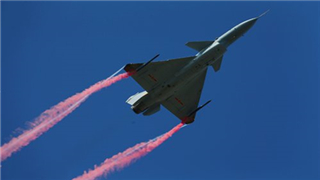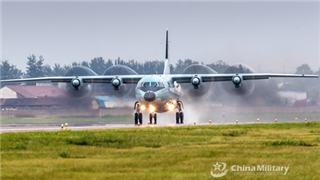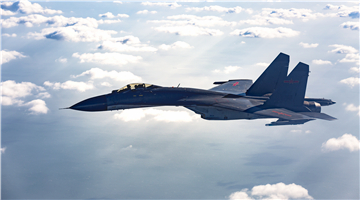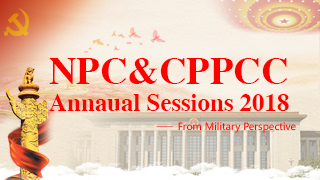
In his book Destined for War: Can America and China Escape Thucydides's Trap?, Harvard Professor Graham Allison compares China-US relations with the historical conflict in ancient Greece, where a rising Athens challenged an established Sparta and created a common pattern between ascendant and consolidated powers that would likely be projected on the future. Allison's intention of writing the book is not to declare that Beijing and Washington will head toward a war, but to suggest bilateral relations are highly likely to be frosty.
Since the reform and opening-up, China's development has been accelerating, making it the world's largest developing country and the strongest emerging power. At the same time, the US, the No. 1 power which has been dominating the international order since World War II, showed signs of decline in some respects, thanks to the financial crisis and the wars in Iraq and Afghanistan. The concept of Thucydides' Trap has been dug out amid comparisons of a rising China and a US on decline.
I agree with Allison's prediction that ties between Beijing and Washington are going down a slope. Over the past decades, there have been obvious fluctuations in the Sino-US relationship. Whenever there are major historical events, there are ups and downs. But the ongoing deterioration in ties is different. China is emerging rapidly and posing a challenge to the US' status in the global arena. Washington, meanwhile, is not willing to shed its leadership role.
In this struggle, Beijing's challenges lie first and foremost in Asia. Americans are worried that China will elbow the US out of Asia, jolting Washington's alliance system in the region by its growing influence or increasing deterrence power over other nations.
But the situation is different from the historical reference. There have been no major powers in history which were so interdependent as Beijing and Washington. This implies Sino-US ties could follow the path of Thucydides' Trap, but could also possibly head to another direction.
Core interests
It is precisely because China wants to avoid the Thucydides' Trap that it raised the new type of major power relationship, which focuses on win-win cooperation. The concept of win-win cooperation is based on the idea of community of shared interests and shared future. Yet one realistic issue is - there is currently no practical way or method to solve the divergences on core interests on both sides.
It is frequently said that both sides should respect each other's core interests. What are the criteria for their core interests? What should we do when our core interests clash?
Take the South China Sea dispute. China is asking for its historical rights in the waters, which is its sovereign right and in keeping with its territorial integrity. Yet given the issue's complex historical background as well as intricate ties between disputing nations, a clear demarcation is hard for the moment and would make little contribution to resolving the differences. It requires a process during which maintaining regional peace and stability accords with interests of all parties.
In recent years, the situation in the South China Sea has developed into a jagged, interlocking pattern in terms of interests of each relevant party and their control over the islands and rocks. It is therefore extremely difficult to figure out the puzzle. Meanwhile, with the growing strength of China, tensions in the waters are deemed by the US as a factor affecting its rights and interests in the region, including military dominance, free navigation and the stability of its alliance there. For Washington, maintaining its leading role after WWII and safeguarding its national and global interests are tied together.
Could we come up with a common standard to define our respective core interests? China did not propose such standard because even if it did, a consensus will still be hard to reach. Traditionally, it can be worked out through negotiations. When that doesn't work, differences are either set aside or resolved via military means. The stronger side emerges on top. The US, which adores power politics more than any other country, has been maintaining absolute superiority as the basis of its diplomacy.
In this background, the concept of building a new type of major power relationship means well, but how to realize it? As far as I am concerned, the process of building it is also a process of interaction with continuous discussions between the two sides.
The US' wrong expectation
Some Americans say China duped them. They hoped Beijing would develop in line with US expectations, but China didn't. This is a groundless argument. China has integrated itself into the international economic system through reform and opening-up. The system is dominated by Western developed nations centered around the US. Beijing-Washington ties have also developed during the process.
The US has different goals and strategic priorities at different stages. Previously, US and China's goals were not completely compatible with each other, but did not clash. Washington has also benefited greatly from its economic and trade ties with Beijing.
US capital has found a new investment market and profited tremendously. American consumers, especially disadvantaged groups, have for a long time enjoyed substantial amount of attractive made-in-China products at a reasonable price, which helped keep US prices down. Americans are used to spending tomorrow's money today and China is contributing to such a lifestyle in the US. It holds over $1 trillion in US debt. That's why the term "Chinamerica" has been created. Nowadays, the interests of China and the US are intertwined.
Some Americans say that the development of Beijing-Washington relations helped China's rise and the emerging China is not what they wanted. But China never promised anyone that it will develop according to US wish. How can they say China tricked them if there is no relevant agreement at all?
Americans whose expectations from China haven't been met should ask themselves - is there anything wrong with their expectation?
When some Americans are stuck with the mind-set that the US has not gained from Beijing-Washington ties, they should be aware that the crux of their problems does not originate in China, but the uneven distribution of benefits they gained from globalization. Some US interest groups made a considerable fortune during globalization, some did not obtain anything and some groups' interests were even infringed.
Since the 1990s, serious imbalance in economic development and distribution of interests within the US emerged. The financial crisis of 2008 and the resulting sluggish economy worsened the contradictions caused by the imbalance. This is the reason why US President Donald Trump won the elections in 2016.
Americans need to find a scapegoat outside their country and they picked China. The US excuse may sound reasonable - China's trade surplus, US trade deficit and reduced American job opportunities are what hurt America. These conclusions are too simple. The truth is, US trade deficit with China is caused by reallocation of resources. To a large extent, many other countries have been shifting their trade deficit with the US to China, because of the latter's large economy and strong manufacturing capability. This is acknowledged by many economists.
The special and differential treatment of developing nations in the WTO was agreed by all and China did enjoy such treatment after joining the organization. But China developed very fast afterward and quite a few Western countries including the US believe those provisions are no longer suitable for China. Washington refuses to accept that China is still a developing country.
Beijing acknowledges that trade deficit is indeed a problem, yet it is a structural issue that needs a process to be solved. Nevertheless, Trump wants it to end instantly and some Americans are using the row to reach their political goal, causing growing tensions in the trade war.
The nature of Sino-US ties
Allison said that the idea of defining China-US ties as "rivalry cooperation" attracted his attention during his recent speech at Renmin University of China. It is understandable. The bilateral relationship is now dominated by competition, and will deteriorate. Nobody knows how much the China-US relationship will sour.
China offered to build a new type of major power relationship to get rid of the tendency and will hold on to it even if the US does not respond.
It is significant not to interpret today's Beijing-Washington relations with the help of old concepts, and not to treat ties with the notion that they are destined to confront each other - like between rising and established powers. But what kind of new relationship will develop is uncertain.
But we should first admit and face the fact that competition is a prominent feature of Sino-US ties in the new era. And the new type of relationship focuses on cooperation. To begin with, the increasing competition between them should be under control. The two countries can synergize their strengths to turn competition into an advantage.
The change could take place by either proactive collaboration or pressure arising from needs of the situation. The relationship between China and the US is too big to fail. If such ties keep going toward confrontation, the two nations, the region and the globe would be severely affected, which is obviously not in anyone's interest.
To establish the new type of relationship, the mind-sets of both sides need to be changed. Washington should learn to accept sharing its leadership with others. China should be well aware of the reality - US status has come about in history, changing it would hence need a historical process which can only be realized through social evolution.
China's mission is to deal with various challenges on the way toward peaceful rise and modernization. Handling its ties with Washington is a test that cannot be dodged. It must keep getting stronger while keeping all the risks of Sino-US competition under control, avoiding a repeat of the cold-war style confrontation between the US and the Soviet Union.
The evolution of history is the alteration of substances and concepts. When both countries' power and mind-sets change, and they realize that a changed global order can better accord with their long-term interests, a new order will emerge.
The author is a senior researcher of Taihe Institute and former president, senior consultant of China Institutes of Contemporary International Relations.











